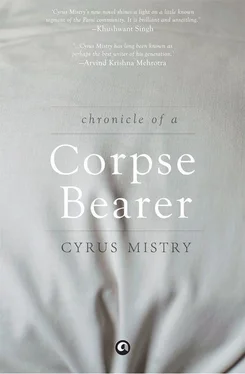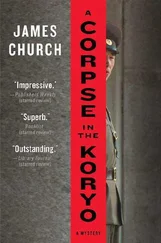‘I was thinking, Father. .if I have to, maybe I could train to become a nussesalar? It’s the closest I’ll ever come to being a priest.’
(I forgot to mention this: some weeks ago, when Mother reported to him that I had finally succeeded in memorizing the longer segments of the liturgy, Father had strongly urged me to pursue my initiation into naavarhood. I pleaded that I needed time to study for my upcoming exam.
‘But there’s no harm in taking your books along,’ countered Father. ‘In the nine days of retreat, when you have to maintain a pious and meditative frame of mind, you’ll find plenty of time to study. Reading is a pious activity. And then see how well you do in your exams! An idle mind, as they say, can so easily become the Devil’s workshop!’
So I did go into retreat, carrying a fat science textbook as alibi, and did try to qualify as naavar, at one of our four main Fire Temples in Bombay, Wadiaji’s, the one near the big ice-cream shop at Charni Road. As luck would have it, on my very second night there, I had a wet dream. The shrivelled-up old dastoorji, Muncherjee, who had been assigned the task of grooming me through my initiation, was crestfallen when he saw the telltale blotches on my freshly laundered, white pajama next morning. Almost writhing in dismay — or was it disgust? — he moaned, ‘ Aai joyoo ? That’s why we keep telling you boys, that’s why we always tell you — finish your naavar ceremony before you turn fifteen at least! Or you’ll have trouble. You’ll have to start all over again, my boy. .’
I could have — started my retreat again, made a second attempt; but just as I had privately resigned to failing my matric a second time over, I had no faith at all in the sustained piety of my own dream life. I gave up on this venture, too, and quietly returned home. . That was almost two months ago.)
‘What did you say?’ asked my father. ‘Nussesalar? Well, that might be preferable, I suppose, to being a mere khandhia,’ he nodded, approving sourly. ‘It’s supposed to be a noble vocation, that’s true. .but you would still remain an outcast, don’t forget. Ostracized from society, unable to meet your family. .’
‘But. .’ I wanted to speak, yet couldn’t find the words.
‘Even if you went through all the purificatory rites and rituals, and even if I was sure you had been through them diligently and precisely, without being lax or slipshod, I still wouldn’t want you to enter my fire temple. .do you understand? Now let’s go to bed. I have to be up tomorrow at 4.30 a.m. instead of at 4 a.m., like I have been doing these last three months — thinking that you were planning to sit for your exams next week.’
I nodded dumbly, and hung my head in shame. As Father rose stiffly to retire to his bedroom, I knew he was a deeply disappointed man.
In all fairness, none of us could possibly have expected the debacle of the corpse to go unnoticed.
A dead body deserves some modicum of respect and deference. That’s a belief that cuts across religious persuasion. Right there on the road where it happened, I’m told, it caused much righteous murmuring. The incident even got a brief mention in the next morning’s Bombay Chronicle , which Vera, Rustom’s daughter (who worked as a steno at Gagrat, Limbuwalla & Co, the well-known solicitor’s firm), brought home with her. Rusi showed me the ripped out snippet.
Bombay, 6th August 1942
Eyewitnesses stood flabbergasted — some even terror-stricken — when an unfortunate corpse toppled off a bier, falling flat on his face in the middle of a busy thoroughfare. Some claimed that the body immediately began to twitch, as though in great agony. Subsequent investigations revealed no substance to this claim, however, which originated, possibly, in some onlooker’s imaginative fancy. The corpse was quickly returned to its place on the bier, and carried into the sprawling, Elysian demesne of the Parsi community at Malabar Hill, wherein its members dispose of their dead. One corpse bearer, who had momentarily lost consciousness— and was probably responsible for the bier’s collapse — soon revived. In a few minutes, traffic on the road began to move smoothly again .
For more than a week, we heard nothing more about this matter. Of course, even more dramatic events took place in our immediate vicinity in the days to come, whose countrywide ramifications probably diverted attention from my own unfortunate fainting fit; though not for long. .

The morning’s funeral had just ended. For once, we had a free moment to ourselves. An impromptu get-together took shape around half a seer of milk that Bomi had to spare.
‘Can’t understand what Sola was thinking when he went and bought an extra half-seer from the shop,’ he said, offering it to Rusi. ‘In this heat, before you know it, it’ll curdle.’
Rusi’s mother, Aimai, made some spicy masala tea for everyone. Farokh and Kobaad were there, too. We were seated on the wrought iron bench on Rustom’s veranda — a few additional chairs had been pulled up — smacking our lips while sipping the aromatically pungent tea, when the first reports began to filter in of a terrific commotion at the Gowalia Tank Maidan, just a short walk from where we were. Today it had been Bujji, Sola, Yezdi and one other person — Manek, if I’m not mistaken — who had been walking past the fairground with a corpse, while these historic events were unfolding. Bujji came up to Rusi’s veranda afterwards and told us what he had heard and seen.
‘ Saala ,’ he said, still wiping his eyes with a kerchief. ‘What dhamaal! How to describe to you, boys? Here you all’re sitting peacefully sipping tea, and there something dreadful’s going on, no more than a stone’s throw away. .’
‘What? What’s going on? Didn’t hear a thing. .’ we exclaimed in unison.
‘They’ve been given marching orders,’ he said, which made no sense at all.
‘Who? What’re you talking about, boss?’
‘Are you okay, Bujji? Why are you crying like that?’
‘Those devils fired some shells in the air that made everybody cry. I’m surprised you guys didn’t hear anything,’ said Bujji.
‘I did, I heard some noise that sounded like firing,’ said Kobaad. ‘But muffled. Too distant and so soft I thought it couldn’t be gunshots. I had no idea what it was.’
It took a half-cup strained from the dregs of Aimai’s tea vessel — which she had promptly reheated for Bujji — to get a coherent story out of him. Apparently, at a recent Congress Working Committee meeting, Gandhi had given his call to the British to ‘Quit India’. This the four khandhias heard from the large crowd of people — both sympathizers and bystanders — who had collected near the maidan where, for perhaps the first time in Bombay, India’s tricolour was hoisted. The crowd, as well as the main organizers of the event were brutally caned by police and later, tear-gas shells fired to disperse them.
‘Did you see Gandhi? Was he addressing the crowd?’ Rustom asked Bujji.
Bujji shook his head.
‘There was some woman who hoisted the Indian flag.’
‘What woman? Wasn’t Nehru there?’
‘No one,’ Bujji explained. ‘All Congress leaders have been arrested, that’s what people say, and Gandhi, too. That chemical they fired at us — whatever it was — makes your eyes burn like anything. .’ he said, dabbing his eyes once again. ‘For a few minutes it blinds you, you feel your eyes are on fire; then the tears start streaming like anything. .’
All four khandhias were alarmed to have been caught in this disturbance because people were being arrested at random around them. But more than that, worried about the corpse they had to carry back safely. Bujji smirked and said, ‘Wouldn’t do to have one more topple off the bier, would it now? This time, it would have caused a stampede.’ The others sniggered at my discomfort.
Читать дальше













